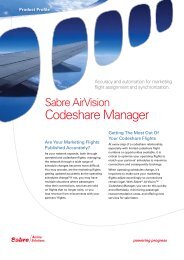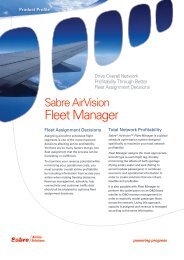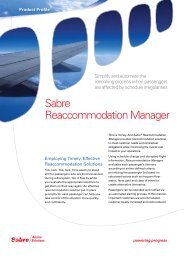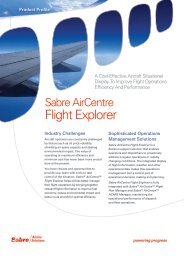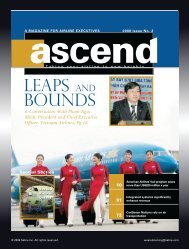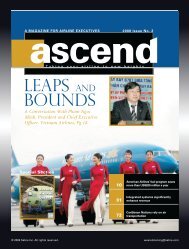2009 Issue 1 - Sabre Airline Solutions
2009 Issue 1 - Sabre Airline Solutions
2009 Issue 1 - Sabre Airline Solutions
Create successful ePaper yourself
Turn your PDF publications into a flip-book with our unique Google optimized e-Paper software.
The KISS Principle<br />
Low-cost carriers from all corners of the world are incorporating characteristics<br />
from the traditional airline model, such as codeshare agreements and frequent flyer<br />
programs, to more effectively compete. And at the same time, established network<br />
carriers are stripping away some of their conventional attributes and implementing<br />
low-cost carrier strategies for the same reason.<br />
By Lynne Clark | Ascend Staff<br />
KISS — or “Keep it simple, stupid”— is<br />
the empirical principle that most systems<br />
will work best if they are kept<br />
simple rather than made complex. It’s also<br />
the principle behind a business strategy that<br />
has made low-cost carriers pose a serious<br />
threat to traditional full-service airlines.<br />
But in today’s economic environment<br />
of over capacity, fluctuating fuel prices and<br />
growing worldwide economic recession,<br />
even the most dedicated KISS advocates<br />
are acquiescing to a 21st-century spin on<br />
KISS — “Keep It Simple And Smart.” Smart<br />
meaning that many of today’s LCCs are<br />
straying from their no-frills roots by adopting<br />
some strategies typical of network carriers<br />
such as offering frequent flyer programs<br />
and entering into codeshare and interline<br />
agreements as well as joining other types<br />
of alliances. These alliances are possible,<br />
in part, to nimble new technologies that<br />
accommodate changing business models.<br />
love And KIss<br />
After nearly 40 years of uninterrupted<br />
profit making, Southwest <strong>Airline</strong>s,<br />
the world’s most successful proponent of<br />
KISS, introduced complexity into its business<br />
model when it announced last year two<br />
new codeshare agreements. In June, the<br />
Dallas Love Field-based carrier announced<br />
an agreement with Canadian low-cost carrier<br />
WestJet to codeshare on cross-border<br />
flights beginning late this year. In November,<br />
it announced plans to enter a codeshare<br />
agreement with Mexican airline Volaris.<br />
Under both new agreements, Southwest’s<br />
Web site will become a distribution channel<br />
for existing WestJet and Volaris flights. In<br />
addition, the carriers most likely will cooperate<br />
on frequent flyer programs, ground<br />
handling and cargo.<br />
Analysts say the moves make sense.<br />
While Southwest <strong>Airline</strong>s has long dominated<br />
the low-cost field, economic pressure<br />
is forcing changes previously not considered<br />
including wide-ranging cuts to its workforce<br />
and expansion beyond its tried-and-true formula<br />
of point-to-point service and simple<br />
fare structures.<br />
“We are continuing to look for ways<br />
to expand our network through international<br />
codeshare partnerships, and we are<br />
excited to team up with Volaris to offer our<br />
customers access to attractive Mexican destinations,”<br />
Bob Jordan, Southwest <strong>Airline</strong>s<br />
executive vice president of strategy and<br />
planning, said in a November press release.<br />
“Volaris has a stellar reputation for being a<br />
highly efficient airline with a dedication to<br />
customer service, which makes it a natural<br />
fit for Southwest <strong>Airline</strong>s.<br />
“We recently announced our decision<br />
to enter the international market with<br />
Canadian carrier WestJet, and we will continue<br />
to work diligently to broaden our international<br />
codeshare service even further,”<br />
Jordan said.<br />
Commenting on the WestJet agreement,<br />
one industry blogger said, “This little<br />
agreement with an almost-unknown (outside<br />
of Canada) airline and Southwest could<br />
be the beginning of a worldwide network of<br />
budget flights, which the flying public has<br />
overwhelmingly decided is the future of<br />
commercial aviation.”<br />
Hybrids emerging to Keep It<br />
simple And smart<br />
The drastic change in attitude toward<br />
codeshares at Southwest <strong>Airline</strong>s has captured<br />
the attention of low-cost carriers<br />
worldwide, many of which have modeled<br />
themselves after Southwest <strong>Airline</strong>s, result-<br />
ing in a new breed of hybrid carriers. These<br />
hybrids, according to a 2007 study by <strong>Sabre</strong><br />
<strong>Airline</strong> <strong>Solutions</strong> ® , are more numerous than<br />
traditional LCCs (see related article on page<br />
23 of Ascend 2008 <strong>Issue</strong> No. 1 via www.<br />
sabreairlinesolutions.com). Of the 123 budget<br />
carriers the study examined, 59 percent<br />
offered products and services that<br />
strayed beyond the sphere of a pure lowcost<br />
model.<br />
Adopted practices include international<br />
routes, using the global distribution<br />
system, codeshare agreements, connecting<br />
services, multiple fares available at<br />
any time, advanced ticketing procedures,<br />
multiple aircraft types, multiple classes of<br />
service, interline agreements and long-haul<br />
destinations.<br />
Only 41 percent of the airlines studied<br />
remained pure LCCs, selling point-to-point<br />
routes on one-class travel, using simple<br />
fares, with no codeshare, on the same<br />
aircraft type.<br />
The hybrid carriers are profitable and<br />
popular. In 2007, these airlines flew 64<br />
percent of passengers looking for budget<br />
air travel.<br />
The research identified easyJet,<br />
Germanwings, Norwegian Air Shuttle,<br />
bmibaby, KD Avia, Centralwings, Blue<br />
Panorama <strong>Airline</strong>s and Flybaboo as hybrid<br />
airlines now along with Southwest <strong>Airline</strong>s,<br />
jetBlue Airways, WestJet, AirTran Airways,<br />
Virgin Blue and GOL Linhas Aéreas<br />
Inteligentes.<br />
The LCC segment is one of the most<br />
competitive in the airline industry, and this<br />
has spurred many pure LCCs to explore new<br />
ways of evolving their businesses to remain<br />
competitive and sustainable. For many, this<br />
has meant adopting some full-service carrier<br />
business practices to help grow their<br />
ascend 33




